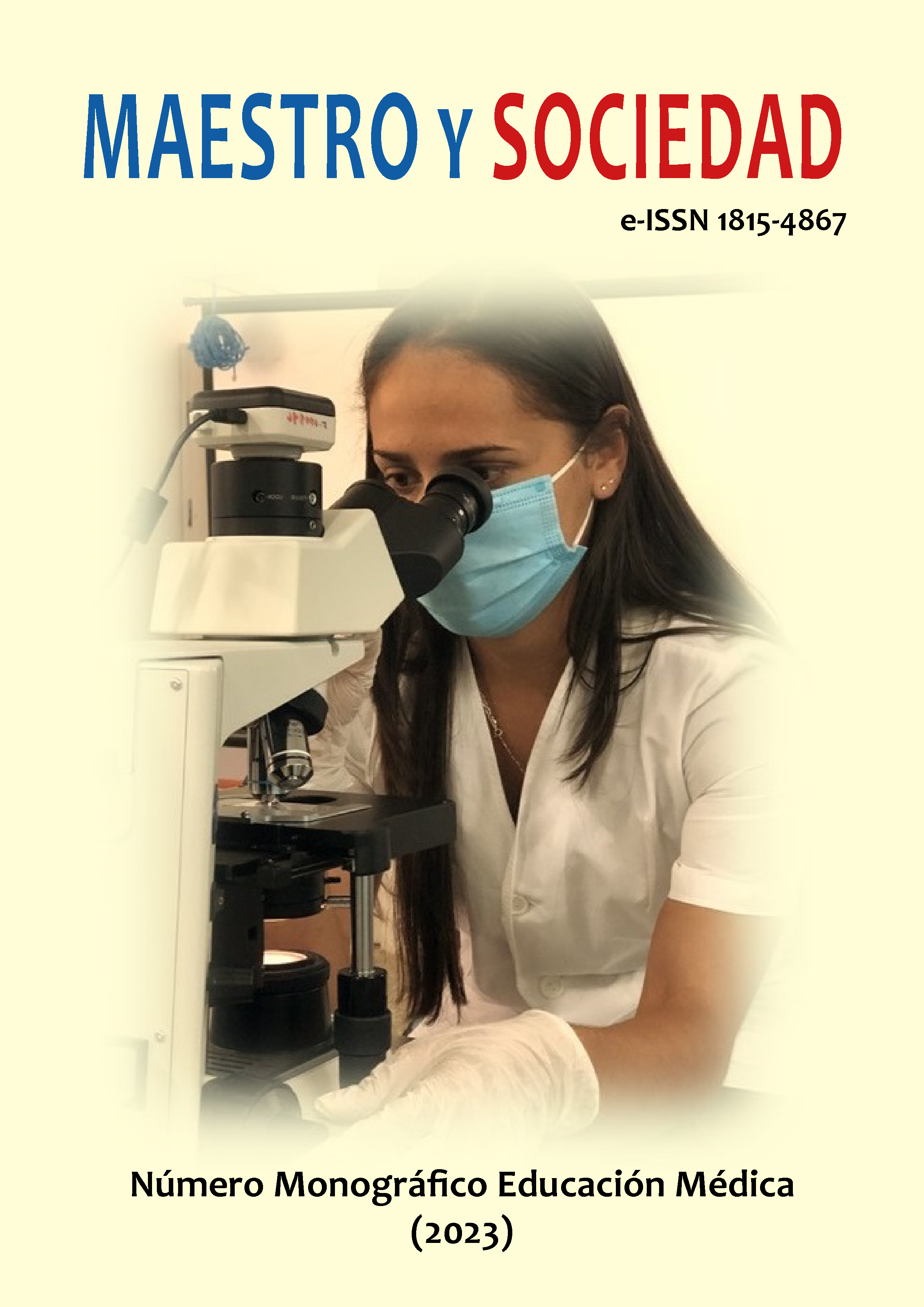Historical characterization of the professional improvement process in teachers of the nursing career
Historical characterization of the professional improvement process in teachers of the nursing career
Keywords:
Nursing career, teachers, professional improvement, and pedagogical cultureAbstract
Introduction: The technical scientific development of society has required progress in the training of human resources
available for it, which favors the continuous improvement of the economic and social spheres that sustain humanity,
especially academic and research training of the professor of the Nursing career. Objective: To characterize the
historical trends of the process of professional improvement in teachers of the Nursing career to favor their pedagogical performance. Materials and Methods: Methods of the theoretical level such as historical-logical, analysis-synthesis,
inductive-deductive were used, the latter to specify the predominant trends, as well as an analysis of the content of
documents, which included original and review articles in specialized magazines on the subject. Emphasis was placed on
the search for research authors in the field of pedagogy improvement in the Nursing career. Results: In Cuba during the
revolutionary period, in order to achieve the projected development in health services, an urgent effort was necessary
in the training of medical, nursing and health technicians, for which the number of medical schools and the training
school for nurses and other medium technicians grew rapidly. The necessary theoretical classes were not taught by
a teaching group and the learning consisted of the occasional thing that a more experienced student, the nurse or
a doctor could teach. Discussion: The professional improvement of the Nursing teacher has given rise to analysis in
several scientific and pedagogical contexts, based on the need that today it is urgent to train new professionals who
are increasingly competent and endowed with skills to creatively transform society, particularly in the understanding
of the humanist values of the profession and in patient care when executing actions of promotion, prevention, early
diagnosis, treatment and rehabilitation, considering the individual not as an object, but as a subject of the relationship of
the health-disease process. Conclusions: The professional improvement of teachers will always be aimed at continuing
with the improvement and transformations in the pedagogical field, coupled with the use of investigative tools and new
technologies, in order to achieve good professional and scientific performance in students, as well as the development
of cognitive independence and creativity that elevate professionalism in this.
References
Camilo de Oliveira C., Chompre R. (2017). Estrategias para el Desarrollo de la práctica de Enfermería. Ponencia
presentada En: Simposio Nacional de Enfermería. Bogotá, Universidad de la Sabana.
Cardentey García, J., González Rodríguez, R. (2016). Aspectos acerca de la superación profesional en la educación
médica. Educ Med Super, 30(1). http://scielo.sld.cu/scielo.php?script=sci_arttext&pid=S0864-2141201600010
&lng=es
Castro, F. (1975). Informe al Primer Congreso del Partido Comunista de Cuba. Cuadernos Políticos. enero-marzo
de 1976. Editora Política, La Habana, 7, 79-97. http://www.cuadernospoliticos.unam.mx/cuadernos/contenido/CP.7/
CP7.8Fidel%20%20castro.pdf
Fundación UNAM. (2013). El rol del maestro en el siglo XXI, un cambio radical de actitud. UNAM. http://www.
fundacionunam.org.mx/educacion/el-rol-del-maestro-en-el-s-xxi-un-cambio-radical-de-actitud/.
López Espinosa, G. J., Lemus Lago, E. R., Valcárcel Izquierdo, N., & Torres Manresa, O. M. (2019). La superación
profesional en salud como modalidad de la educación de posgrado. Edumecentro, 11 (1), 202-217. http://scielo.sld.cu/
scielo.php?script=sci_arttext&pid=S2077-28742019000100202&lng=es
Medina González, I., Valcárcel Izquierdo, N. (2016). Superación profesional del licenciado en Enfermería para la
solución de problemas en su desempeño profesional pedagógico. Educ Med Super, 30(1).
Olivé-Ferrer, M. C., Getino-Conseco, M. R., Sanfeliu-Cortes, M. V., Bardajì-Fandos, T. (2014). El diario reflexivo.
Una vivencia de aprendizaje en las estancias clínicas enfermeras. Revista Iberoamericana de Educación, (1), 1-13.
Rodríguez Aguilar, Y., Aguilar Ramírez, I., Morales Requeijo, A. A. (2022). La superación profesional dirigida a
docentes de Enfermería como vía para mejorar la atención del adulto mayor. Rev Hum Med, 22(1), 34-54. http://scielo.
sld.cu/scielo.php?script=sci_arttext&pid=S1727-81202022000100034&lng=es
Santiago, R. y Fonseca, C. D. (2016). “Ser buen profesor, una mirada desde dentro”, EDETANIA, 50, 191-208.
https://revistas.ucv.es/index.php/Edetania/article/view/27
Segura Massó, A. A. (2014). Contribuciones del nuevo modelo pedagógico de enfermería para la carrera. AV
Enferm, 32 (2), 299-305.
Urbina, O., Pérez, A., Delgado, J. (2013). El modelo de actuación de Enfermería y su valor humanista. Rev Educ
Med Super, 17(3).
Vela-Valdés, J. et al. (2018). Formación del capital humano para la salud en Cuba. Revista Panamericana de Salud
Pública, 42 e33. https://doi.org/10.26633/RPSP.2018.33
UNESCO. (2019). https://es.unesco.org/themes/educacion-superior/ods
Zabalza, M. (2002). La enseñanza universitaria. El escenario y sus protagonistas. Narcea.
Published
How to Cite
Issue
Section
License
Copyright (c) 2023 Onnis Del Río Pérez, Juan Antonio Tamayo Suárez, Leidiana Yaumara Martínez Rodríguez, Katia Aguilera Díaz

This work is licensed under a Creative Commons Attribution-NonCommercial-NoDerivatives 4.0 International License.
This journal provides immediate open access to its content, based on the principle that offering the public free access to research helps a greater global exchange of knowledge. Each author is responsible for the content of each of their articles.



























 Universidad de Oriente
Universidad de Oriente 